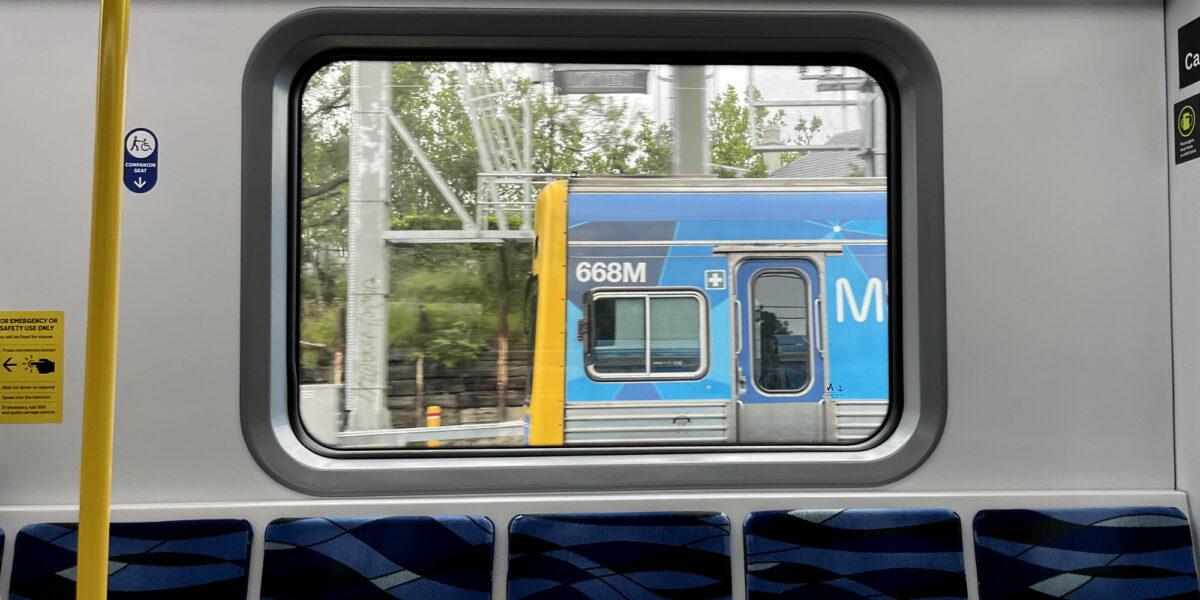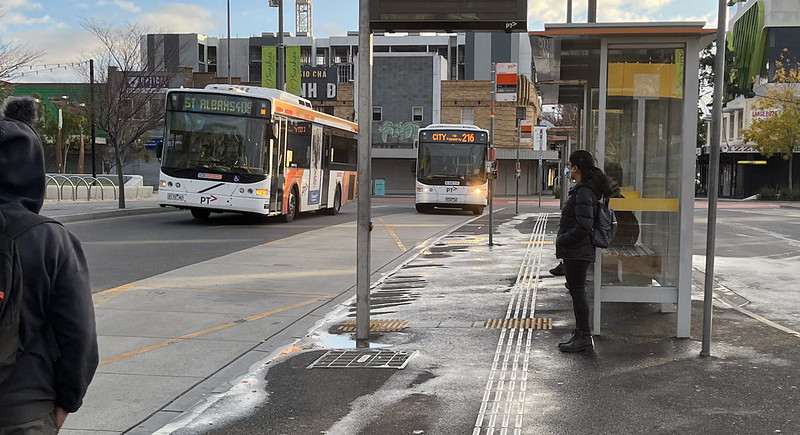It’s just a week to go until the Victorian state election, and early voting has been underway since Monday.
So how do the major parties compare on transport issues?
Labor is trading off its record since 2014, with 67 level crossings removed, and projects currently funded and underway to get that number to 110.
There aren’t really any new major transport projects being promised – just continuation of the existing ones, many of which are pretty big: the trouble prone West Gate Tunnel, the gigantic (and also trouble prone) North East Link, and the even more huge Suburban Rail Loop stage 1 (the eastern section), as well as the Metro Tunnel and Airport Rail (now cheekily rebranded as SRL Airport).
They’re also pledging V/Line service upgrades and extra carriages.
The Greens are the only one of the three big parties pledging widespread service improvements: high frequency trams and trains, and a vaguer (though implied to be strong) boost to buses.
They’re also continuing to rail against the EV road user charge – a very destructive position to take. EVs need purchase cost incentives; they absolutely don’t need free driving.
The Coalition has a good set of policies including tram extensions for route 3 to East Malvern, route 48 to Doncaster Shoppingtown, and route 75 to Knox (oddly including a study into which mode it should be – extending a tram route with anything other than a tram makes no sense). They’ve also got a package of upgrades to bus routes, which is a good start towards usable bus services in Melbourne and regional cities.
They also are pledging rail extensions to Clyde in Melbourne’s southeast, and electrification from Frankston to Baxter, both good policies.
They want to scrap the Suburban Rail Loop, of course. I think this is the wrong decision, given the huge benefits of SRL, but given it also comes at a huge cost, I can see why they’ve made this pledge.
Undermining all the Coalition’s good policies are their continuing fixation on building East West Link, deferring the EV road user charge, and their metro fares policy.
Fares – racing to the bottom
All three parties are pledging cuts to fares, but in different ways.
- Labor wants to cut V/Line fares to max $9.20 per day, in line with metropolitan – probably a bit over the top, but at least it doesn’t completely destroy the revenue base. No changes proposed for metropolitan fares.
- The Coalition wants to halve V/Line fares (pretty sensible, fixes a lot of anomalies), and slash metropolitan fares down to $2 per day (incredibly rash; it would reduce revenue down to less than the cost of fare collection)
- The Greens want free PT for all under 21s, and deeply discounted monthly, quarterly and yearly passes – a flawed strategy which slashes revenue while making the best discounts only available to the wealthiest people who can pay ahead up-front.
I hate to sound like a broken record, but here it is again: fares need to be affordable. In this context, V/Line fare cuts make some sense, as some fares are very expensive.
But as long as fares are affordable, the priority must be service improvements – and wiping out fare revenue jeopardises that. So the Greens and Coalition proposals for drastic metropolitan fare cuts are not good.
Solving cost of living pressures is laudable. But in the context of transport, it’s about getting people out of cars, not about giving people who already use public transport a further discount, especially for the demographic who don’t need it.
What’s missing?
The big thing missing – particularly from the Labor and Coalition policies – is a package of service improvements. This is easy, affordable (because you’d use track and fleet capacity used in peak but otherwise dormant) and would make a huge difference.
For instance: a pledge that buses would run on weekends as frequently as off-peak, and that trains would be boosted to every 10 minutes where possible, would hugely improve public transport competitiveness. It would also support jobs both directly via hiring more drivers and support staff, and by opening up access and opportunity.
You might recall the Coalition made such a train pledge in 2017… and then walked it back, going silent on it into the 2018 election.
Who’s the best?
But what are we to make of what has been pledged?
The Greens policies are pretty strong on public transport, and it’s great to see them pushing service upgrades. But you’d expect that because they’re the Greens. One would hope if by some miracle they end up a partner in a coalition with Labor that they push on this.
Labor is steady-as-she-goes, emphasising their infrastructure record and pushing on some V/Line upgrades – but they don’t have much to say on metropolitan service improvements.
The Coalition actually has a very good set of transport policies. If it wasn’t for the rash fare cuts and the fixation on East West Link, I would argue it’s a lot better than Labor’s.
That’s my take. Agree? Disagree? Feel free to comment.
Bring on election day! And don’t forget to vote below the line in the upper house.
- PTUA’s election scorecard
- The Parliamentary Budget Office has an excellent Election Commitment Tracker
- The Melbourne On Transit blog is running a local campaign on more services for bus route 800: Fix800Bus


12 replies on “Vic election 2022 policies compared”
A well balanced summary of pledges and I agree regarding affordable fares, as well as rail extensions. It’s a shame Melton and Wyndham Vale have missed out on electrification.
According to the political promise, the 75 extension to Knox will be a tram. The extensions to Ferntree Gully and Bayswater are the ones where the mode is undecided.
Nice summary, thank you daniel.
“Labor wants to cut V/Line fares to max $9.20 per day, in line with metropolitan”
If implemented, it would cost the same to travel from Flinders St Station to Southern Cross (i.e. a 1.5km trip taking 3 minutes) as Bendigo to Southern Cross (150km taking 2 hours). This is just ridiculous. The cost of providing the former trip is much less than the latter so the fare structure should reflect this.
I have just returned from a visit to Sydney.
For concession card users, the daily cap is around $2.xx for the whole Sydney Trains network. That includes, down to Wollongong, and Kiama, and the little diesel services further south. I certainly did this trip myself last week.
I could also, go up to Newcastle, and, run the full length of the DMU network up there too. All for $2 something.
That in comparison, is easily, like a trip to Geelong and Bendigo. If Sydney can, why not us?
I will ask, what are the policies of the smaller parties, in case we get a hung parliament?
Parties smaller than the Greens only matter in the Legislative Council. In the Legislative Assembly, where government is formed, it is near certain that only ALP, Coalition, Greens and independents will be elected.
@Bobman, agree, would be great to see a real commitment to fixing western suburbs rail.
@Flanders, yeah – the 75 pledges have been a bit confusing. The original promise was a feasibility study for extending it to Knox and beyond. It seems like they then changed their minds and pledged tram to Knox but a study beyond.
@TranzitJim, no. The $2.50 Opal cap only applies to Gold Seniors/pensioners.
That’s fine for those who use it, but fundamentally is an unrealistically low price, and helps drive up the prices for everybody else.
Give cheap fares to those who actually need them. For others, affordable but fair fares. The priority is better services, not ridiculous discounts.
I fully support the EV road mileage charge, but only after the State and Federal governments have brought down the price of buying a new EV to match the affordability of petrol cars – I’m not going to hold my breath, but increased fuel quality mandates and more meaningful subsidies to sub-LCT vehicles would go a long, long way to reaching that. Until then, Dan’s tax is mindlessly premature – perhaps he should stick to a PT-only portfolio, on which he truly exceeds all his peers and predecessors.
“Give cheap fares to those who actually need them”. I agree.
One way the government could do this is by providing Myki money to health care card and pension card holders. Top up their Myki with $20 per month, or $250 per year, or whatever. That would go a long way towards making transport more affordable for the people who need it most, and would still be far cheaper than $2 max fares for everyone.
In particular, it would help people on JobSeeker who struggle to find the money for fares to job interviews, DES/JSP appointments, and their workplace. (Yes, some people on JobSeeker have jobs. They’re just not given enough hours. JobSeeker is for the underemployed as well as the unemployed.)
There will still be some people who fall through the cracks – people living in poverty who for whatever reason aren’t eligible for a health care card – but arguably they have problems greater than just the affordability of public transport. The affordability of doctors’ visits and prescription medications, for starters. And the solution for that group would be to find some way of making them eligible for a card.
[…] blog on transport […]
@Karen. Alternately, why not just make concession Mykis charge no fares or very low fares? I think that’s simpler than the government transferring money into a myki every month.
Hi Daniel. First time commenter. Do you know when these plans will come into effect. (The vline cap)
@Jake, there have been noises that the V/Line fare cap will start in March.
I think this would be a bad idea. They should make sure the V/Line service increases start at the same time, as the fare cut will almost certainly lead to huge crowding problems on unbooked services, particularly on weekends.